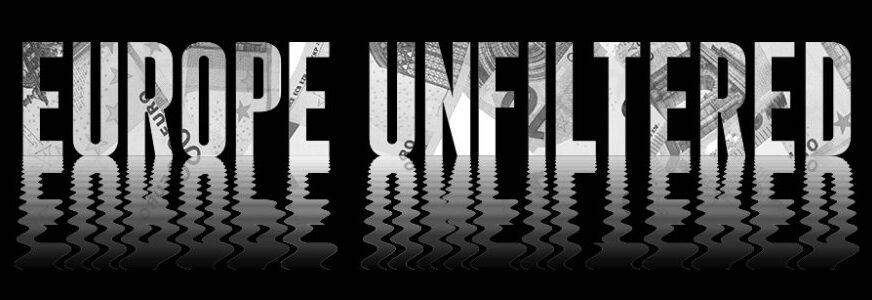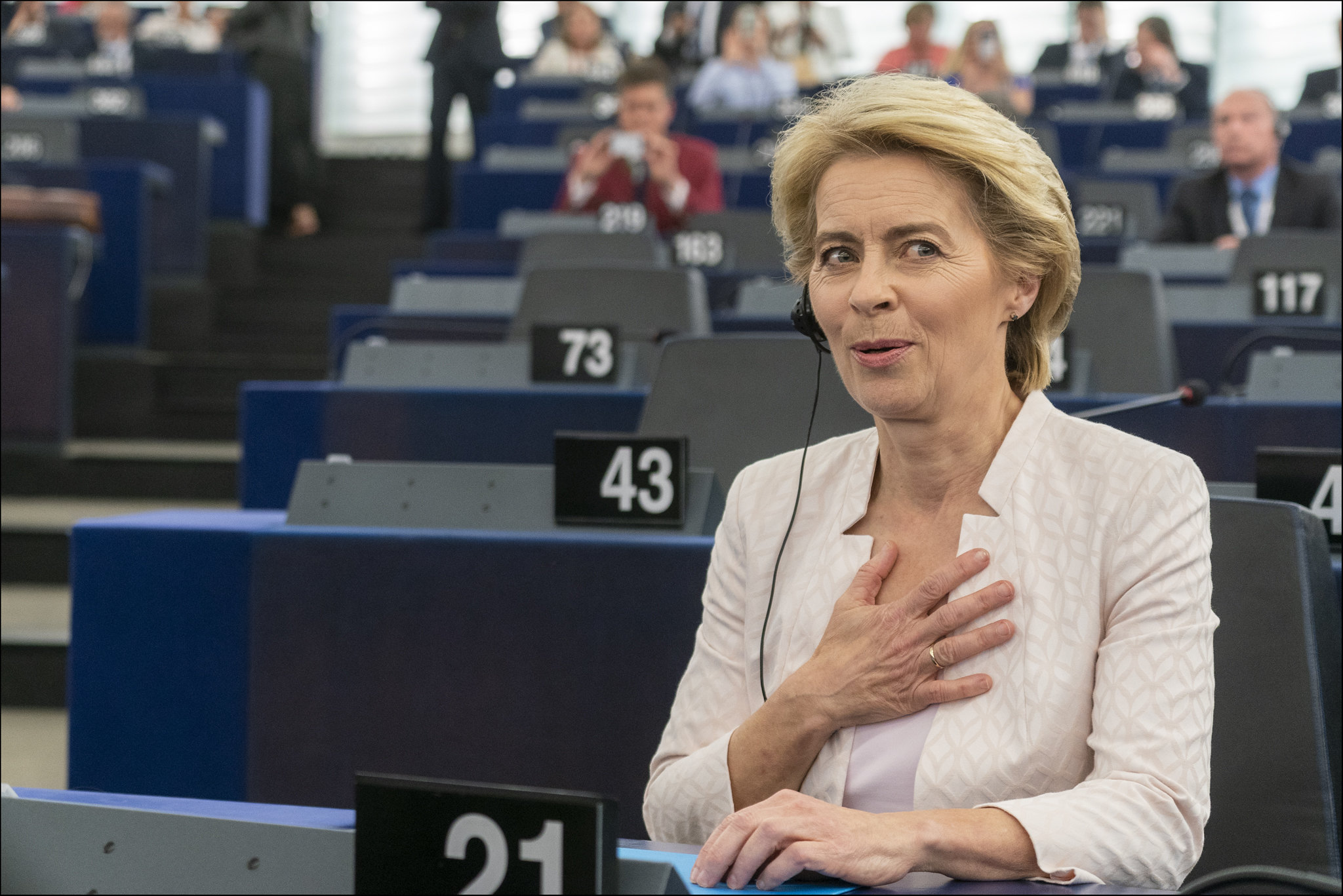Should Ursula von der Leyen fail to be appointed to a second term as European Commission President, the business world would most likely welcome the retired German politician with open arms.
To the shock of many, POLITICO which tried to track down the secrets of VDL’s ’little black book’, revealed that VDL, a German dentist and mother of seven, who has built a remarkable political career over the past decade and has been President of the European Commission since 2019, runs a kind of elite business club in her office in the Commission’s headquarters. According to the report, membership to this club has been granted mainly to German and American businessmen, who had privileged VIP status in the Berlaymont Building.
Welcome to von der Leyen’s secret business world, a safe haven for German and American lobbyists!
Until now, VDL’s sound-proof and stylish office proved to be well-protected against outside influences, including questions of curious investigative journalists and European Ombudsman Emily O’Reilly’s calls for transparency – this all have been left at VDL’s door while the secrets of multi-billion euro deals, the evidences of maladministration and the cases of abuse of power, corruption and inflence peddling have been kept within the walls of the EU’s office No1.
It was found that, Madam President of the European Commission has been running an extensive business network in the heart of the European Union for years. As it was mentioned above, American business representatives seem to be very important to her, but US companies rank clearly second behind the Germans, with French companies in third place. During the last couple of years, VDL met with German-based companies on a regular basis which led to a strange situation – these German lobbyists had direct access to her. In order to be in the very center of European decision-making and to make it easier to keep in touch with VDL, the lobbyists and their organisations moved to Brussels’ European Quarter.
So why is this a matter of concern? Well, because there are clear rules that require European Commissioners to leave their national interests at home. No other rules apply to von der Leyen. However, the recent scandal clearly signals that the commissioners’ boss has absolutely no concern for Europe, but her actions are motivated by German national interests.
’The meetings of the President and of her Cabinet fully reflect the policy priorities of the Commission’, Commission spokesperson Arianna Podesta said responding to journalists’ questions. This arrogant response clearly indicates that both VDL and her cabinet are aware of the fact that the disclosure of the secrets of the little black book is the worst thing that could happen just a few months before the European elections.
The scandal with the little black book shouldn’t have come as a surprise to anyone who has followed European politics and von der Leyen’s activities in particular, including the priorities she has set during her term of office and her responses to the new challenges the EU has faced in recent years such as green transition, digitalisation, tackling coronavirus pandemic, economic sanctions against Russia and financial and military support for Ukraine. Over the years, it has become clear that all these areas have been seen by her as good business opportunities to conclude deals and make money – having this particular aspect constantly in mind, the President of the European Commission started to behave like a selfish German businesswoman, as if she were personally engaged in global megabusinesses.
The German lady’s direct deal with an American pharmaceutical giant – the Pfizer scandal
Considering that this was the biggest contract ever sealed for COVID-19 vaccines during the coronavirus pandemic, it’s worth recalling European Commission President Ursula von der Leyen’s strange and scandalous role in this business.
The deal attracted big media attention due to the fact that in an interview in April 2021, VDL revealed that she negotiated this €1.8 billion deal directly with Pfizer’s CEO via SMS, in advance of the EU signing the contract with the American company. The deal was formally announced one month later. Following a journalist’s request, VDL failed to publicise the texts. The Commission, commenting on the incident said that text messages don’t need to be registered and stored.
Despite a legal proceeding by The New York Times is underway aimed at obliging VDL to disclose the content of the SMS exchanges, there is little chance the content of the text messages will be made public.
Key questions such as whether the text messages in question were private messages of a politician, or whether VDL in fact destroyed public documents and whether it is fair to accuse her of corruption remain unanswered.
The Rheinmetall’s success story in Ukraine – VDL’s silhouette in the horizon?
The announcement of the registration of the joint venture of the German arms manufacturer company Rheinmetall and Ukraine’s state-owned defence company last October during the German-Ukrainian Business Forum in Berlin, interestingly, didn’t receive significant media attention, despite the fact that this initiative is directly related to an even more remarkable development, namely that in 2023, Ukraine became the largest recipient of German weapons. After the first agreement, Rheimetall expected to sign contracts with Ukraine to establish two more joint ventures to produce ammunition and air defence equipment.
According to some media reports, since the beginning of the war, Germany has sent weapons worth more than €15 billion to Ukraine. These weapons include air defence systems, tanks, infantry fighting vehicles and other military equipment. In February, Germany and Ukraine signed a bilateral security agreement in Berlin. According to this official paper, in 2022, Germany provided Ukraine with military assistance worth a total value of €1.68 billion and in 2023, more than €5 billion. In 2024, Germany has decided to provide financial means for military assistance worth a total value of €7.1 billion.
At this point, it’s worth mentioning words of the then Polish PM Mateusz Morawiecki who back in 2023, warned President Zelenskiy against a close alliance with Germany, noting that Ukraine shouldn’t forget that it was the Germans who considered sending 5,000 helmets to besieged Kyiv…
After all this, one question must be raised, namely, who is the top European politician who has stood up most often and most firmly saying that Ukraine should be supported, including with weapons, ’as long as necessary’? It’s not difficult to guess – this politician is VDL.
In 2024, VDL’s eighth child, the EDIS was born
On 5 March, the European Commission and the High Representative for Foreign Affairs and Security Policy presented the first-ever European Defence Industral Strategy (EDIS) at EU level and a New Defence Industry Programme (EDIP) to boost Europe’s arms industry, with a proposed spending 1.5 billion euros.
According to the Commission’s press release, ’A stronger and more responsible European defence industry will benefit the Member States and ultimately EU citizens. It will also benefit the EU’s key partners, including NATO and Ukraine.’ In line with VDL’s efforts, the EDIS proposes developing closer ties with Ukraine through its participation in EU initiatives in support of defence industry and stimulating cooperation between the EU and Ukrainian defence industries.
This means that the EU would now see Ukraine as a quasi-Member State in the field of defence industry, making many of the EDIP initiatives available to Kyiv. This is, in fact, a net result of von der Leyen’s political and business machinations which are closely linked with the Rheinmetall’s above described expansion in Ukraine.
A new Europe is being created under an influential German-hearted businesswoman
With all her skills and influence, VDL intends to continue as President of the European Commission for another five-years term. After that her German CDU party announced in February VDL’s candidacy as the Spitzenkandidat for the European elections, the EPP congress in Bucharest on 6 March cleared the path for her second term. As part of her new programme, she well in advance announced the idea of establishing a new EU Commissioner for defence.
When it comes to Ursula von der Leyen and Europe’s future, it’s necessary to ask simple yes-or-no question such as is she really the best choice for a second term in the EU’s top job and, does she really intend to stop the war in Ukraine? Is she interested in it at all? Is it really in Europe’s best interests to keep a former German Defence Minister with active German and American business ties in charge of the bloc, especially when a bloody war in the EU’s neighbourhood threatens to escalate? Should one believe VDL that supplying Ukraine with weapons is really about creating the preconditions for a just peace?
The answer to each questions is a definite NO.

